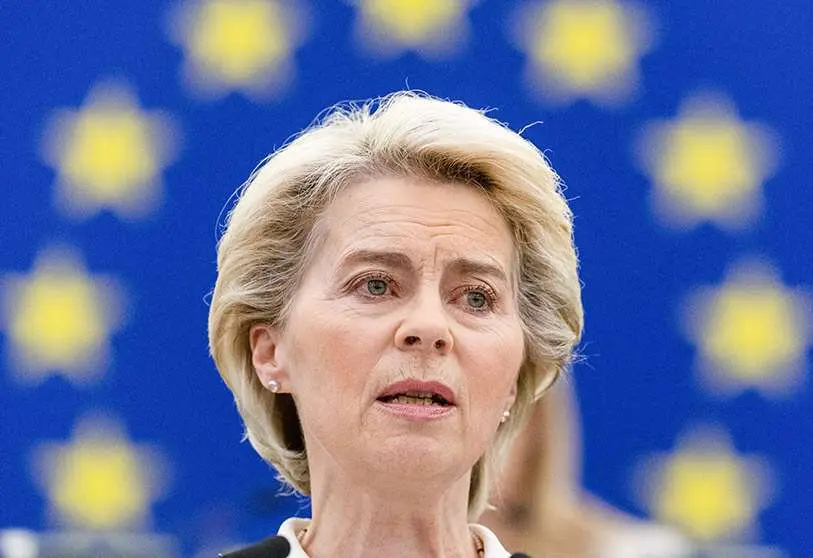European Commission proposes Russian oil embargo

The European Union is presenting its sixth package of sanctions against Russia for its offensive against Ukraine, which is entering its 70th day. As part of this new set of sanctions, European Commission President Ursula von der Leyen has proposed a ban on Russian oil. This measure, as the German politician has acknowledged, "will not be easy", as many member states are highly dependent on Russian energy. Brussels will therefore work to "eliminate Russian crude oil in an orderly way, maximising the pressure on Russia and minimising the impact on European economies". "We have to do it," Von der Leyen stressed.
#Russian forces have reportedly launched missile attacks on #Ukrainian military positions deployed in the territory of the #Avozstal steel plant in the besieged south-eastern city of #Mariupol. pic.twitter.com/WF8WhTd4d6
— ANews (@anews) April 25, 2022
Before the European Parliament, the Commission President called on the EU-27 to phase out imports of Russian oil within six months and of refined products by the end of the year. However, Hungary and Slovakia have already announced that they will not support sanctions against Russian energy as both nations are too dependent on these supplies. Russian oil accounts for around 25% of total European imports.

Slovakian Economy Minister Richard Sulik pointed out that the country's Slovnaft refinery cannot process crude oil from other sources and would need four to six years to do so. For this reason, Bratislava will insist on exemption from the European embargo. Hungarian Foreign Minister Péter Szijjártó said that it is currently "physically impossible" for Hungary and the economy to function without Russian oil. "Hungary's energy supply cannot be at risk, because no one can expect us to allow Hungarians to pay the price for the war in Ukraine," Szijjártó said, according to The Guardian.

At the other extreme is Germany, which, despite its heavy dependence on Russian gas, has managed to reduce imports of Russian oil since last year. According to POLITICO, Germany's Minister of Economics and Climate, Robert Habeck, has indicated that his country could end its oil dependence on Russia in "a matter of days". The country currently imports 12% of Russian crude oil, down from 35% before the war.
Moscow had exactly one chance to use energy against Berlin. Going forward, Germany will no longer be dependent on Russian oil or gas and that will have a huge impact on European politics. pic.twitter.com/5Ju8mcBHt7
— Marcel Dirsus (@marceldirsus) May 4, 2022
The European debate on the Russian oil embargo begins on Wednesday. The results, which must be approved unanimously, will be known in the coming days. On the exemption of Hungary and Slovakia, EU officials have not provided details, although this scenario looks increasingly likely for the embargo to go ahead.

"Our goal is simple: we must break the Russian war machine. And I am confident that the council will imminently impose new sanctions, in particular on Russian oil," said European Council president Charles Michel. According to diplomatic sources, Russian President Vladimir Putin's decision to cut off gas supplies to Poland and Bulgaria has been a determining factor in reaching a European consensus on the oil embargo, as POLITICO reports.
Some 30 Ukrainian demonstrators gathered outside the European Council in Brussels on Friday to call on EU member states to impose an embargo on Russian energy oil and gas pic.twitter.com/mRGcGYpSpz
— Reuters (@Reuters) April 29, 2022
The new round of sanctions also includes the exclusion of Sberbank, Russia's largest financial institution, from the SWIFT international banking payment system. The European leader recalled that Sberbank owns around 37% of Russia's banking sector.

Von der Leyen also said the sanctions will be extended to three Russian state broadcasters that act as "mouthpieces and aggressively amplify Putin's lies and propaganda". These media outlets will not be allowed to broadcast their content in the EU in any form, including by cable, satellite, internet or telephone applications.
For all those concerned with Ukraine starting WW3 — here's a new clip of Russian TV propagandists claiming the nuclear war is a probable outcome. They also urge the Kremlin to launch nukes. "We'll go to Heaven, they will simply croak." #ArmUkraineNow #StandWithUkraine️ pic.twitter.com/sknhN01MZ0
— Artem Risukhin ?? (@oh_rhys) April 28, 2022
The new European sanctions will target high-ranking military officers and others who committed war crimes in Bucha. "We know who they are. They won't get away with it," Von der Leyen said. A few days after the discovery of the massacres around Kiev, InformNapalm identified Lieutenant Colonel Azatbek Omurbekov as the leader of the unit stationed in Bucha.

Those sanctioned also include Patriarch Kirill, the head of the Russian Orthodox Church who supports and "blesses" Russia's invasion of Ukraine, as well as the wife and children of Kremlin spokesman Dmitry Peskov.

As Brussels finalises the sixth package of sanctions, Russian troops in the city of Mariupol are once again attacking the Azovstal steel plant, the last pocket of Ukrainian resistance in the city on the Sea of Azov. More than a hundred civilians have managed to flee the Azovstal bunkers thanks to evacuations led by the United Nations and the International Red Cross. After weeks of horrific shelling, children, women and elderly people have arrived in the Ukrainian-controlled town of Zaporiyia.








